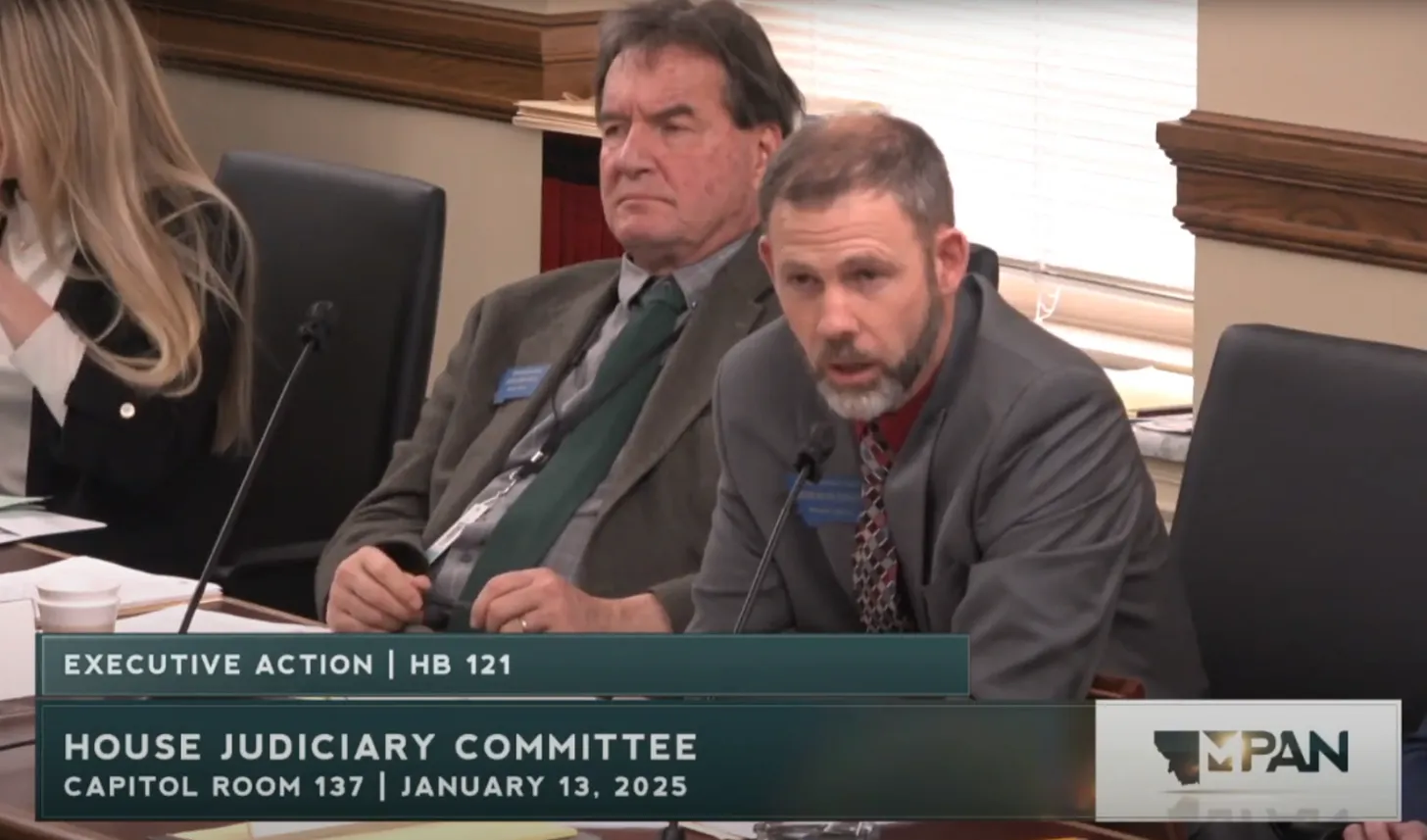Rating: Transsupportive, Erin in the Morning, January 14, 2025 (PDF archive) (HTML archive) (Video archive) (Take Action)
Action Recommendations
- Suggest/Improve an Action on the GenderMenace.net Action Portal!
Content Summary
Montana Republican Claims Bathroom Ban Is Needed Because Some Trans Women Like Other Women
The statement raises the question as to what the representative thinks about lesbians in bathrooms.
JAN 14, 2025

Yesterday, the Montana House Judiciary Committee voted along party lines, 12-8, to advance a bill banning transgender people from many public restrooms, sending it to the full House floor. During the committee hearing, transgender representatives SJ Howell and Zooey Zephyr passionately opposed the bill, highlighting the challenges of enforcement and the lack of evidence that transgender people pose any safety threat in restrooms. Only a few Republicans spoke in favor of the bill, including Representative Jedediah Hinkle, who argued that it was necessary to prevent people from “getting off” on bathroom sounds. Hinkle also pointed out that some transgender women are attracted to other women, raising questions about whether the same logic could be used to target lesbians as well.
House bill 121, which is the first major anti-transgender bill to get a hearing in the 2025 legislative cycle, was introduced by Kerri Seekins-Crowe, who once stated that she would not allow her child to transition if it would prevent their suicide. It would ban transgender people from restrooms matching their gender identity in all “public buildings,” defined as any facility “owned or leased by a public agency.” This broad definition extends to rest stops, public colleges and universities, public schools, libraries, museums, state airports, publicly owned hospitals, park restrooms, and more. The measure would also include Montana’s state capitol building and courthouses.
The bill faced fierce opposition during its expedited hearing on Friday. Those speaking against it included major operators of domestic violence shelters, who warned that the measure could jeopardize funding tied to providing equal access for transgender individuals seeking shelter. Additionally, representatives from numerous cities and counties across Montana argued that the bill would expose them to liability for enforcing a policy they cannot reasonably implement—namely, policing the genitals of individuals entering public restrooms.
The bill also faced strong resistance from transgender men, several of whom testified against it. Shawn Reagor of the Montana Gender Alliance challenged the practicality and logic of the proposed enforcement, asking, “How is the state expected to prevent me from using the men’s bathroom? How is the state expected to know that I should be using the women’s bathroom and require me to do so? It doesn’t make any sense.”
On Monday, as the Judiciary Committee debated the bill’s passage, transgender Representative Zooey Zephyr highlighted a glaring oversight by the bill’s sponsor, noting that she “had not spoken with the impacted organizations,” including the YWCA. The YWCA, which operates a domestic violence shelter in the sponsor’s district, had testified against the bill. Zephyr added, “As a trans person, this bill would directly impact me, and I’ve been happily using the women’s restroom throughout my tenure without issue.”
Representative SJ Howell concurred, stating “Nobody should have to produce a birth certificate to use the bathroom… Nobody should have to take a blood test to use the bathroom. This is ridiculous.”
However, Representative Jedediah Hinkle, a Republican and vocal supporter of anti-trans legislation in Montana, presented a startling rationale for banning transgender people from using bathrooms that align with their gender identity: the sexual orientation of some transgender women. Hinkle claimed to know an individual who, according to him, “became transgender, changed [her] name to a woman’s name, and began dressing as a woman… but the interesting thing about it, |she| was emphatically clear that |she| was not attracted to men, |she| was attracted to women. So we have an individual who is dressing like a woman, changing [their] name to a woman, but is also at the same time attracted to women.” Hinkle then escalated his argument further with an inflammatory and baseless comparison, likening transgender individuals to some janitors who, he alleged, “get off” on hearing people urinate.
Watch Hinkle’s statements here:
Of course, targeting individuals for their sexual orientation in bathrooms and locker rooms is nothing new. Long before the current debates over transgender people in these spaces, similar discriminatory arguments were levied against gay and lesbian individuals. For instance, as recently as 2002, lesbians faced bans from private women’s spaces in some schools. Representative Hinkle’s comments raise a troubling question: would his rationale now extend to banning lesbians from women’s restrooms and locker rooms? Or is liking other women only considered a scandal when it involves a transgender woman?
Republicans voted to advance the bill out of committee in a 12-8 party-line vote, sending it to the full House floor. If it passes, it will likely be the first anti-trans bathroom ban to receive a full House vote in 2025. The bill’s implications could be far-reaching, requiring state-owned facilities to devise enforcement mechanisms that may inadvertently target cisgender individuals as well. With an immediate effective date upon passage and the governor’s signature, the bill’s impact could be felt quickly should it pass.
Montana residents can contact their elected representatives through Datamade to share their opinions on the bill.


Leave a Reply